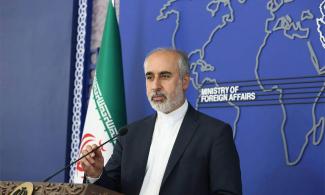
Mahsa Amini, 22, a Kurdish woman, was arrested in September for not wearing her hijab properly. She died three days after her arrest. Iran violently suppressed the protests that followed, Reuters reports.
The Iranian Government has said it has proof that the United States of America and other western countries were behind the protests that were held across the country recently.
Mahsa Amini, 22, a Kurdish woman, was arrested in September for not wearing her hijab properly. She died three days after her arrest. Iran violently suppressed the protests that followed, Reuters reports.
A statement released by the ministry of foreign affairs spokesman, Nasser Kanaani , said, "We have specific information proving that the U.S., Western countries and some of the American allies have had a role in the protests.”
According to VOA, the New York-based Committee to Protect Journalists has documented that as of last Wednesday, 41 journalists have been detained. A handful of them were later released on bail. Most are accused of taking part in the protests they were covering.
But CPJ and other journalists' rights organizations remain concerned for those behind bars, including journalists detained in Tehran’s Evin Prison.
Four journalists believed to be held in Evin are still unaccounted for after a fire at the facility on Saturday, according to the International Federation of Journalists.
IFJ reported it had identified at least 10 journalists in the prison, including some detained in relation to the protests. Of those, six contacted family to say they were safe. But as of Monday, the families of four others had heard nothing since the fire.
“We are very concerned about the fate of our colleagues in Evin and remind the Iranian authorities that they are responsible for the lives of journalists in prison,” IFJ general secretary Anthony Bellanger said in a statement.
Bellanger called for the “release of all journalists who are unfairly detained in Evin and other prisons in Iran for doing their job.”
CFWIJ has confirmed at least 20 cases of female journalists being detained across Iran since the protests broke out.
“In a country where women in the media are in the minority, this is a significant number, and we feel the crackdown on women journalists is particularly linked to their gender and reporting,” Kiran Nazish, CFWIJ’s founding director, told VOA in an email.
“These arrests continue, despite the fact that most journalists (and activists) are also in hiding,” Nazish said.
With access to the internet blocked in many parts of Iran, getting information out and providing safety advice to those who are inside is difficult.
“This has been so consistent that most people we are in touch with think this is being done deliberately to misguide families and cause further distress,” Nazish said.
In a joint statement Monday, Human Rights Watch and dozens of other rights organizations said that since September, more than 1,000 “protesters, human rights defenders, civil society activists, journalists, university students and schoolchildren have been arbitrarily arrested and detained, some already charged with ‘acting against national security.’”